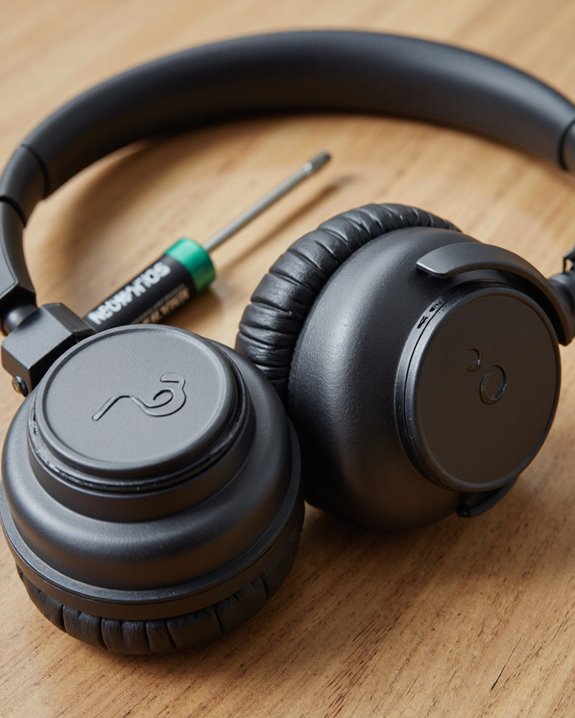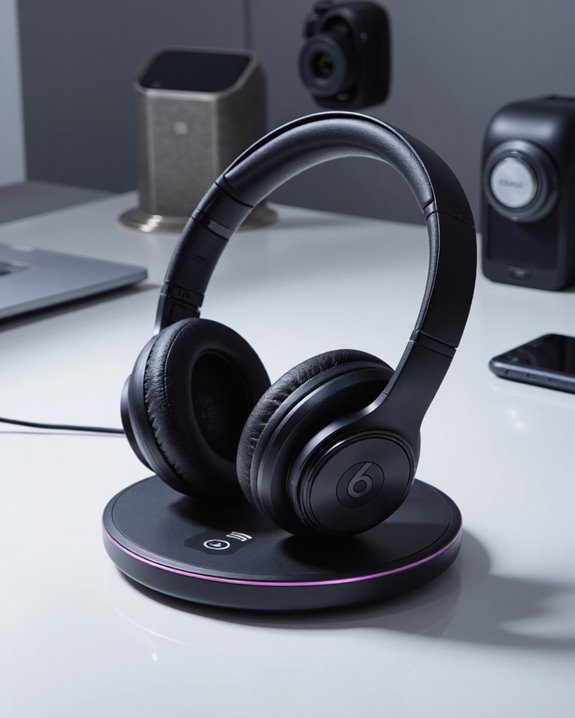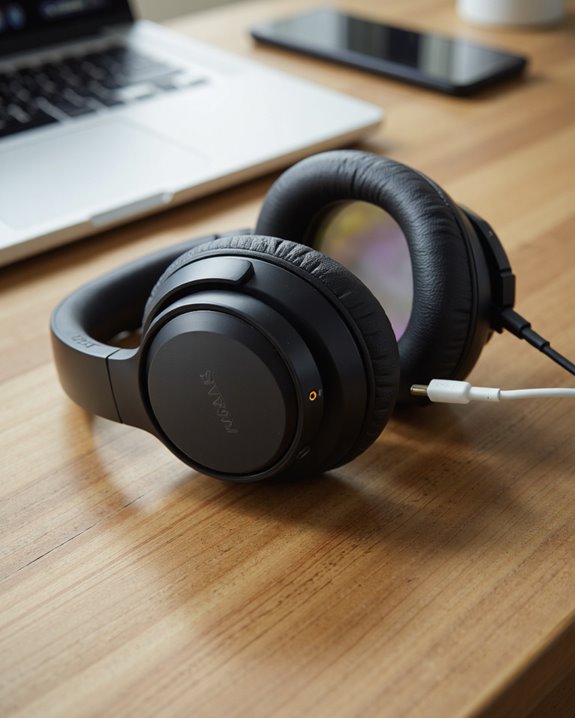As an Amazon Associate, we earn from qualifying purchases. Some links may be affiliate links at no extra cost to you. Although our opinions are based on curated research, we haven't used these products. Articles generated with AI.
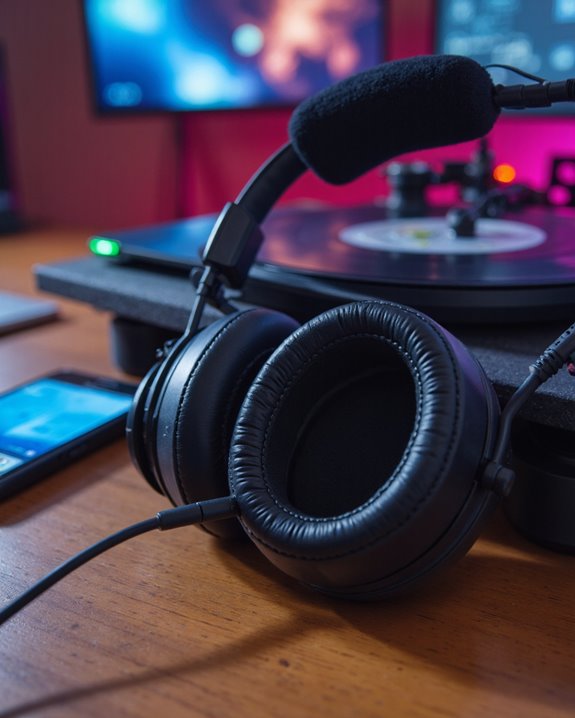
Are Gaming Headphones Good for Listening to Music?
Gaming headphones work well for music listening if we value powerful bass, immersive soundscapes, and long-term comfort thanks to plush padding and ergonomic designs. Unlike music-focused headphones—engineered for balanced frequency response and detailed audio—gaming headsets tend to boost low frequencies and offer features like virtual surround sound, which can suit electronic or hip-hop genres but might lack accuracy for classical tracks. Customizable equalizers and noise isolation are common, and certain models outperform others depending on our audio priorities. To explore specifics, see below.
Key Takeaways
- Gaming headphones can deliver decent music playback, but their sound signature often emphasizes bass and immersion over audio accuracy.
- High-end gaming headsets may offer good audio quality, but music headphones typically provide more balanced and detailed sound.
- Built-in microphones and comfort features make gaming headsets versatile for both gaming and casual music listening.
- Customizable equalizer settings on some gaming headsets allow users to adjust sound profiles to better suit music genres.
- Audio purists or critical listeners may prefer dedicated music headphones for superior fidelity and natural soundstage.
Understanding the Differences Between Gaming Headsets and Music Headphones
While gaming headsets and music headphones might appear similar at first glance, their design philosophies and technical specifications differ considerably based on intended use. Gaming headsets prioritize an immersive sound experience, often elevating bass frequencies to enhance in-game effects, which shapes their frequency response. Meanwhile, music headphones focus on high-fidelity audio quality and accurate sound reproduction across the spectrum, favoring a balanced frequency response. Comfort is tailored to usage focus—gaming headsets deliver plush padding for long gaming sessions, while music headphones emphasize durable, ergonomic structures for extended music listening. Microphone performance also sets them apart: gaming headsets integrate built-in microphones for clear communication, whereas music headphones typically lack this feature. Aesthetic design diverges as well, with gaming headsets adopting bold, RGB-lit looks and music headphones opting for understated sophistication. Additionally, gaming headsets often feature 7.1 surround sound technology to provide an immersive spatial audio experience that music headphones usually do not emphasize.
Sound Quality Comparison: Gaming Headsets vs. Music Headphones
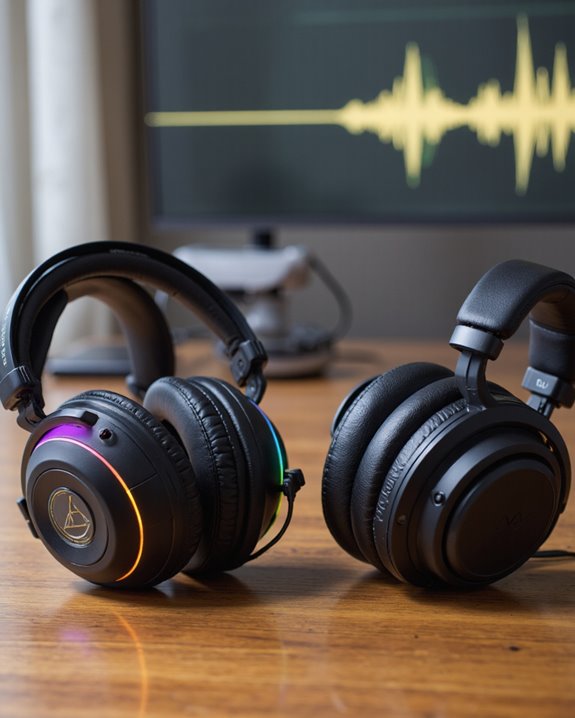
Having explored the core design differences between gaming headsets and music headphones, let’s now scrutinize how these distinctions manifest in their sound quality.
Gaming headsets typically prioritize immersive soundscapes, emphasizing bass response to enhance in-game effects. This often results in a less neutral sound signature, which may not suit all genres when listening to music. In contrast, music headphones are engineered for audio accuracy, offering a wider frequency response and more detailed audio reproduction. They excel in providing a neutral sound signature, precise imaging, and clear instrument separation—qualities essential for critical listening. While some high-end gaming headsets deliver impressive sound quality, they frequently fall short in frequency balance and detail compared to dedicated music headphones. Ultimately, personal preferences and music genres play pivotal roles in determining the best choice for sound quality. For example, headphones like the PHILIPS SHP9600 open-back design create a natural soundstage ideal for detailed guitar monitoring, highlighting the benefits of specialized music headphones.
Key Features of Gaming Headsets for Audio Playback
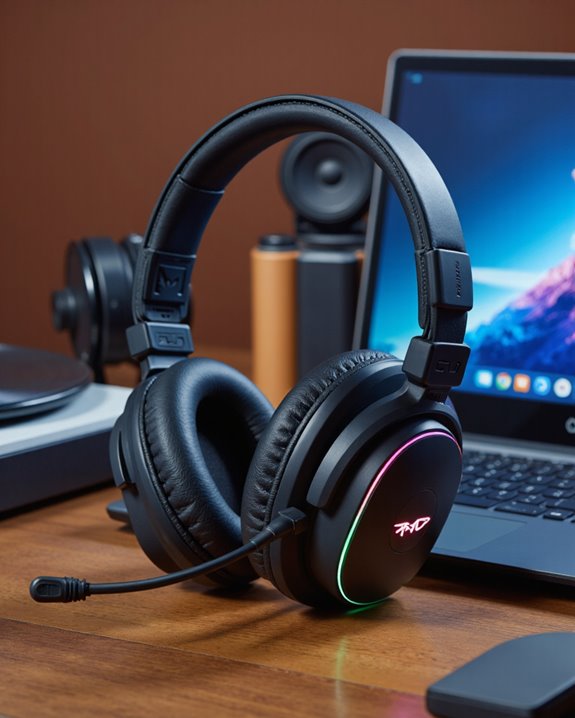
Although gaming headsets are primarily marketed toward gamers, their audio playback features make them increasingly viable for music enthusiasts seeking versatility. Let’s break down the key features. Most gaming headsets utilize high-fidelity audio drivers, delivering rich and accurate sound reproduction across a broad frequency spectrum—crucial for appreciating diverse music genres. Advanced noise isolation technology further enhances sound quality by minimizing external distractions, ensuring an immersive listening experience. Customizable equalizer settings let us fine-tune treble, mids, and bass, tailoring playback to our personal preferences. Many models also integrate virtual surround sound, adding spatial dimension and depth not found in standard stereo headphones. Combined, these elements elevate the overall audio playback, making gaming headsets an effective option for those valuing precise, adaptable, and engaging music experiences. Additionally, some headsets like the Turtle Beach Stealth 500 offer sound customization through dedicated apps for enhanced audio control.
Comfort and Ergonomics: Long Listening Sessions
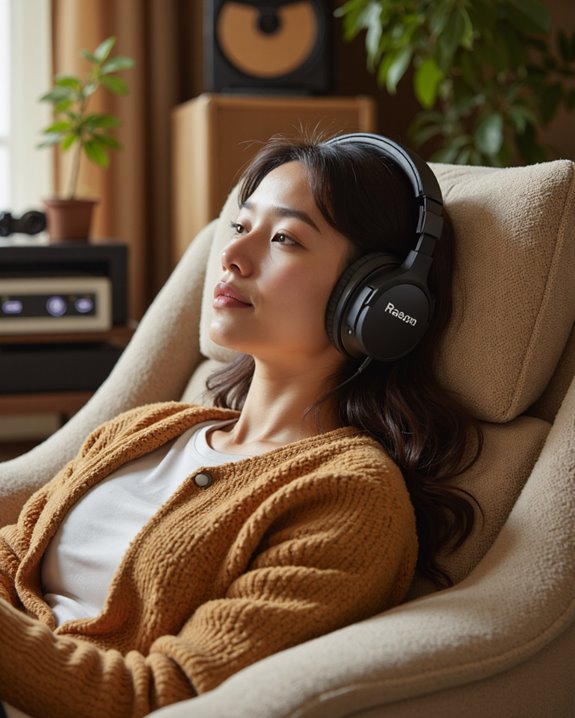
Because comfort is critical during any prolonged listening session, gaming headsets are engineered with features specifically tailored for extended use. Many models employ plush padding and lightweight materials to guarantee that we can enjoy long listening sessions without fatigue. Cushioned ear cups conform to the shape of our ears, distributing pressure evenly and minimizing discomfort over time. Adjustable headbands further enhance ergonomics by creating a secure yet gentle fit for various head sizes, reducing the need for frequent adjustments during prolonged use. This thoughtful design makes gaming headsets versatile, accommodating both intense gaming marathons and hours of uninterrupted music playback. Some, like the HyperX Cloud series, are frequently praised for their combination of lightweight construction and ergonomic features, making them especially suitable for users prioritizing comfort during extended listening.
Microphone Performance and Its Impact on Music Listening
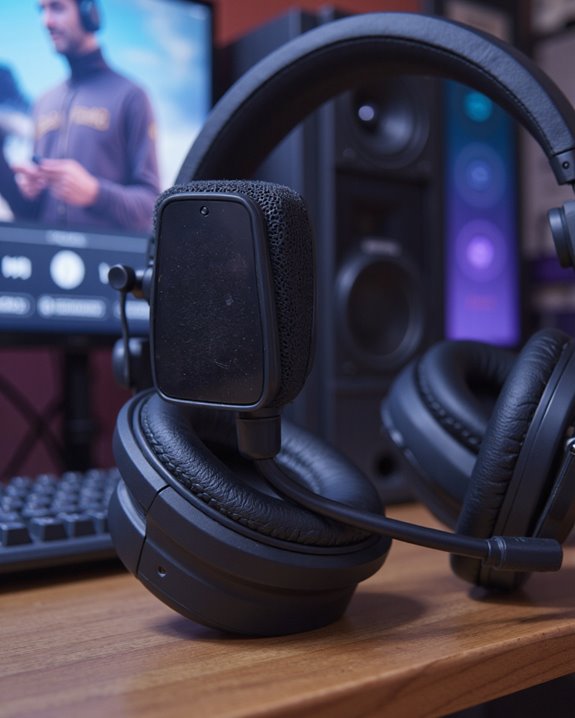
While most gaming headsets are equipped with built-in microphones tailored for voice communication, it’s important to recognize that these features rarely enhance the quality of music playback. Microphone performance in gaming headsets is primarily optimized for clear speech during gaming or calls, not for improving audio quality during music listening. Many models feature noise-canceling microphones, which reduce ambient sound during communication, but this doesn’t directly affect the clarity and fidelity of music tracks. In contrast, dedicated music headphones prioritize audio fidelity, focusing on delivering a superior overall listening experience without the added components for voice chat. If we value microphone performance for gaming, we may compromise on the nuanced audio quality essential for music enjoyment. Ultimately, microphone features don’t enhance music listening.
Genre Suitability: Which Music Types Sound Best on Gaming Headsets?
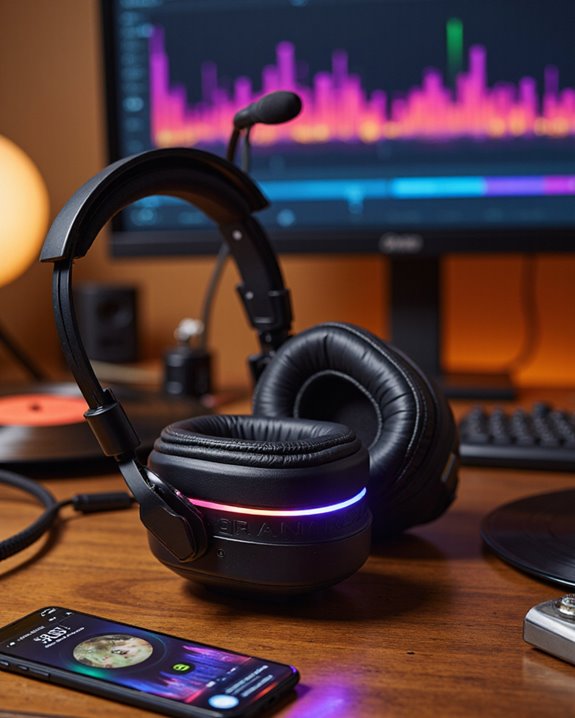
When evaluating which music genres sound best on gaming headsets, it’s essential to take into account how these devices are engineered to emphasize specific frequency ranges. Gaming headsets typically deliver a bass-heavy audio experience, making them a solid choice for genres like EDM and hip-hop, where impactful low-end response enhances sound quality. However, for music genres that demand a balanced frequency response and detailed sound reproduction—such as classical, jazz, or acoustic—gaming headsets often fall short compared to dedicated music headphones. Their immersive experience benefits action-packed or cinematic tracks, but mid-range detail may suffer. Ultimately, genre suitability is influenced by personal preferences: some listeners may prioritize comfort and features over absolute fidelity, while others seek accuracy for nuanced music styles.
Customization and Equalizer Settings for Music Optimization
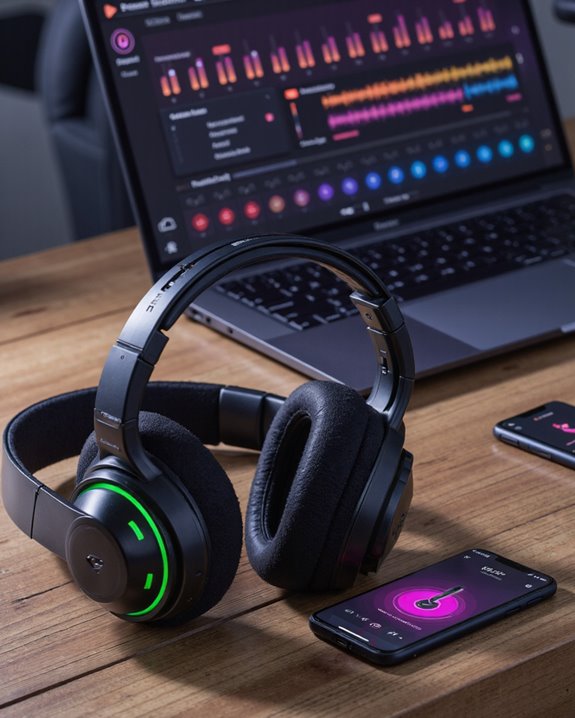
When it comes to music optimization, gaming headsets often provide extensive customization options through their equalizer settings. These allow us to fine-tune sound profiles, adjusting frequencies to better suit different music genres and balance audio output. Many headsets include companion software, enabling us to save multiple preset EQ configurations and effortlessly switch between gaming and music listening. Using these settings, we can mitigate the common emphasis on bass, achieving a more accurate and enjoyable listening experience across genres—from classical to hip-hop. Preset EQ configurations for popular music genres are frequently available, streamlining music optimization for various preferences. Ultimately, by leveraging these audio settings, we enhance playback, tailoring the headset’s sound to our individual tastes and listening environments.
Popular Gaming Headset Models Recommended for Music
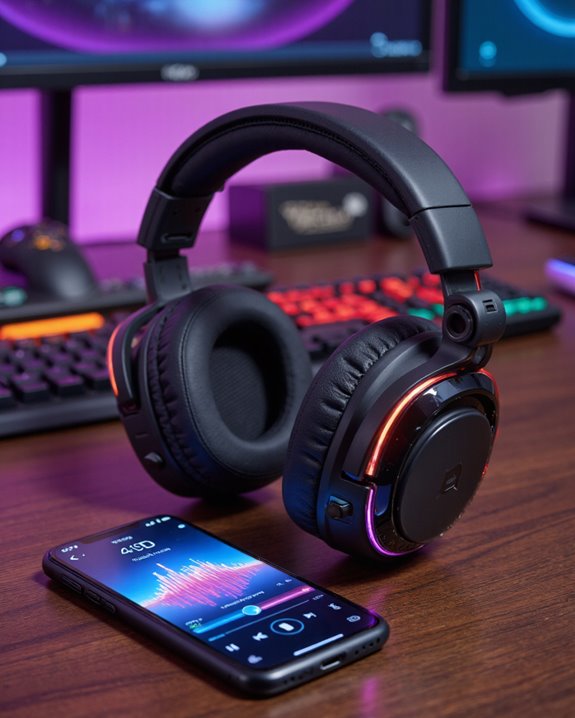
Selecting the right gaming headset for music involves evaluating both audio fidelity and ergonomic comfort, as not all models deliver equally across genres and user preferences. Among the top contenders, the SteelSeries Arctis Pro stands out for its high-fidelity sound quality and plush design, offering music headphones-level clarity alongside gaming features. The HyperX Cloud II impresses with its balanced audio profile and comfort, making it a favorite for immersive audio in both games and music. Corsair Void Elite RGB provides custom-tuned 50mm drivers, enhancing audio performance with rich, detailed playback. For listeners seeking spatial depth, Razer Kraken Ultimate delivers THX Spatial Audio, enriching genres that benefit from surround effects. Finally, the Logitech G Pro X excels with versatile sound quality and a secure, comfortable fit.
Budget Considerations and Value for Money
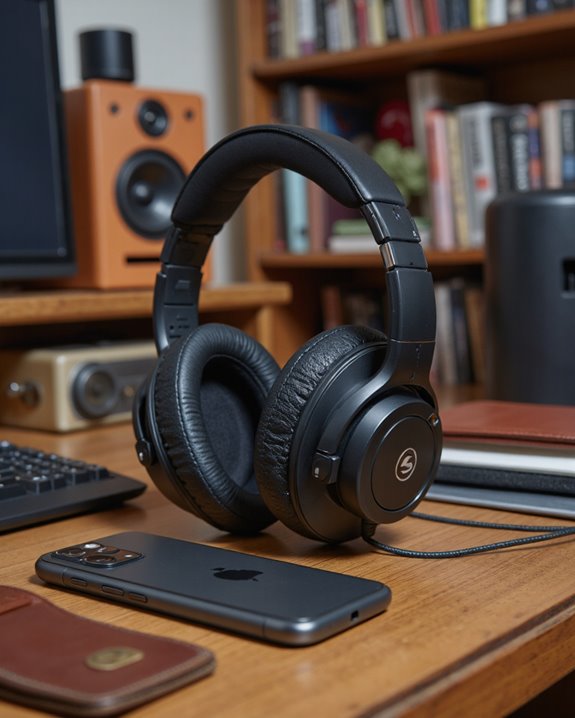
Although audio purists might gravitate toward dedicated music headphones, it’s clear that budget gaming headsets—typically priced between $50 and $150 CAD—present a compelling value proposition for users seeking versatility. Within this range, we find models delivering decent audio quality, essential features, and reliable construction. For casual music listeners, headsets like the HyperX Cloud Stinger offer satisfactory music experiences while maintaining solid in-game performance.
Investing in versatile gaming headsets around $200 CAD can yield improved audio fidelity and enhanced comfort for extended music listening sessions, though pure music headphones in this bracket may achieve superior sound accuracy. Ultimately, the dual functionality of budget gaming headsets provides better value for money, particularly for those balancing entertainment needs on a budget without sacrificing core performance.
Frequently Asked Questions
Is a Gaming Headphone Good for Music?
When we consider if a gaming headphone is good for music, we should weigh sound quality, comfort level, audio clarity, bass response, noise cancellation, design features, price range, brand comparison, usage scenarios, and, of course, user preferences.
Can I Use a Gaming Headset to Listen to Music?
Let’s say we’re comparing wireless options like Logitech and Razer—yes, we can use a gaming headset for music. Sound quality, comfort level, design features, price range, and durability factors all depend on our user preferences and brand comparisons.
Do Gaming Headsets Damage Hearing?
When we use gaming headsets at high volume levels for long usage, we risk hearing loss and ear fatigue. While immersive experience and noise isolation boost audio clarity and sound quality, proper headphone safety and monitoring frequency response are essential.
What Is the Difference Between Gaming Headphones and Music Headphones?
When we compare gaming headphones and music headphones, we’ll notice sound quality, design differences, microphone features, comfort levels, audio drivers, frequency response, build materials, brand comparisons, price ranges, and user preferences all play important roles in their distinction.


